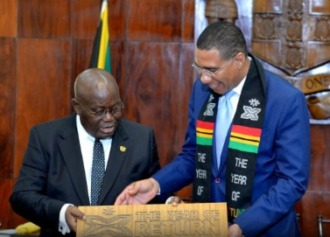Public access to anti-retroviral (ARV) drugs is responsible for a precipitous drop in the spread of HIV/AIDS in Jamaica, medical authorities said Sunday.
The Caribbean country has seen a significant reduction of up to 50 per cent in the number of people who have died from the deadly disease since the public introduction of the anti-retroviral (ARV) drugs in 2004.
Standard antiretroviral therapy (ART) consists of the combination of at least three antiretroviral (ARV) drugs to maximally suppress the HIV virus and stop the progression of HIV disease. Huge reductions all over have been seen in the rates of death and suffering when use is made of a potent ARV regimen, particularly in early stages of the disease.
According to Health Minister Dr. Fenton Ferguson, who noted the success of the Caribbean region in achieving a 42 percent reduction in AIDS deaths between 2005-2011, Jamaica has come a long ways with its own achievements in HIV/AIDS.
“Three hundred and thirty-three deaths (197 males and 136 females) were reported in 2010, compared to 665 in 2004,” he said Sunday during his address during the National World AIDS Day service at St Matthew’s Anglican Church in Allman Town, Kingston. “This represents a 50 per cent decrease in AIDS deaths since the inception of universal access to ARV in 2004 and a 46 per cent decrease when compared to 2000 (617).”
Ferguson said that the country’s HIV program has been lauded as one of the best in the Latin American and Caribbean region, but he largely attributed the reduction in AIDS deaths to increased testing, improved HIV surveillance and increased HIV awareness among the general population.
Ferguson also mentioned that tangible efforts have been made to meet the new 2015 targets under the 2011 political declaration on HIV/AIIDS, which includes further reduction in the HIV through sexual intercourse and drugs injection, increased access to treatment, reduction of tuberculosis-related deaths in people living with HIV and the elimination of new HIV infection among children.
Ferguson appealed to Jamaicans to assist in the Mission to Zero New Infection – which is the theme for this year’s observance – by getting tested.
By getting tested, he said, people would know their status. If their tests are negative, they will be able to protect their partners and children, access treatment and support and become advocates in order to stem the disease.
“I am convinced,” he said, “that we can achieve this mission despite the impending challenges, most significant, the funding of program.”
In the meantime, Rev. Father Whitson Williams challenged Jamaicans through his sermon to reach out to persons who are living with the disease, not to discriminate against them and also to help in the fight to eliminate HIV.
He urged Jamaicans to follow in the footsteps of Christ, who chose to be close to people despite their situations and conditions.
“We, too, must look at people in spite of their situations and conditions and see how best we can help,” said Williams. “And as we touch people, touch them with compassion.”
The church service marks the official beginning of the observance of World’s AIDS Day that will include a national event at the National Heroes’ Park on November 30 that will feature HIV and syphilis testing.


